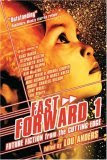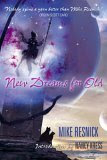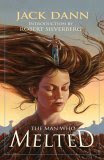Rob H. Bedford has posted his review of Martin Sketchley’s The Liberty Gun over on SFFWorld. Rob likes the book, and I’m gratified to see so much praise heaped on the characters, both human and alien, in what is a fast-paced action novel. Furthermore, Rob writes:

“Flavoring the whole of the novel are many themes – gender roles, sexuality roles, and adjustment to the alien. These themes balance very well with the high-octane action scenes. Throughout the novel, Sketchley continues to inject the adrenaline into the series, between breakneck chase scene and the tooth-and-nail fights. The novel draws to a relatively predictable close, though the specifics aren’t quite as predictable, if that makes sense. It was easy enough to follow Sketchley’s path, but the last few turns were a bit surprising. The Liberty Gun brought the novel to a satisfying conclusion, Sketchley left himself enough wiggle room should he wish to return to these characters.”
brought the novel to a satisfying conclusion, Sketchley left himself enough wiggle room should he wish to return to these characters.”
Elsewhere, over on his Rob’s Blog o’Stuff, he posts his thoughts on the favorite reads of the year, including a few Pyr titles. Of David Louis Edelman’s Infoquake , he says:
, he says:
 “What [Scott] Lynch did for my fantasy reading taste-buds, Edleman did for my Science Fiction reading taste-buds. A believable protagonist in an all-too plausible extrapolated future with a Big Idea and backed by a future history was a lot of fun to read. Check out my review from earlier in the year.”
“What [Scott] Lynch did for my fantasy reading taste-buds, Edleman did for my Science Fiction reading taste-buds. A believable protagonist in an all-too plausible extrapolated future with a Big Idea and backed by a future history was a lot of fun to read. Check out my review from earlier in the year.”
Sean Williams’s The Crooked Letter : “This was another beautiful Pyr book; Williams blended elements from all the speculative fiction branches to create a stew of the fantastic and horrific. The second book, The Blood Debt, published in October and while different in some respects, it was a fantastic continuation of the over-reaching saga.
: “This was another beautiful Pyr book; Williams blended elements from all the speculative fiction branches to create a stew of the fantastic and horrific. The second book, The Blood Debt, published in October and while different in some respects, it was a fantastic continuation of the over-reaching saga.
Chris Roberson’s Paragaea: A Planetary Romance : “Part SF, part fantasy, part physics, and part pirate novel, Roberson pulled off a nice trick in this one. I’d love to read more about these people and the strange and familiar world.”Blogger: Pyr-o-mania – Edit Post “Give Me (More) Liberty!”
: “Part SF, part fantasy, part physics, and part pirate novel, Roberson pulled off a nice trick in this one. I’d love to read more about these people and the strange and familiar world.”Blogger: Pyr-o-mania – Edit Post “Give Me (More) Liberty!”
Mike Resnick’s New Dreams for Old : “I’ve heard and read of Resnick’s reputation, with all the awards he’s both won and for which he’d been nominated. This book showed me why.”
: “I’ve heard and read of Resnick’s reputation, with all the awards he’s both won and for which he’d been nominated. This book showed me why.”
Meanwhile, over at his House of Awkwardness, novelist and tv scribe Paul Cornell picks Infoquake as his favorite SF novel of the year. “A future of business and competition that we can all identify with, which neatly avoids apocalyptic cliché, and thus the adoration of the British SF critics. I’ve blogged about it before, otherwise I’d say more. And hey, catchphrases you can use online: towards perfection!”
Along with, it should be noted in fairness, a less than favorable review of Paragaea, the website Ideomancer posts the first review of my own upcoming anthology, Fast Forward 1: Future Fiction from the Cutting Edge :
:
“This anthology is proof hard science fiction is still a vibrant, worthwhile endeavor for any writer; here’s hoping this anthology series has a long, healthy life.”
Amen!
.jpg) about science fiction and its writers, the future, music and the impetus behind the soon-to-be-released anthology, Fast Forward 1: Future Fiction from the Cutting Edge. Along with the interivew, they have also posted the introduction I wrote for the anthology, “Welcome to the Future,” where readers of this blog won’t be surprised to find me proselytising the cause of SF yet again.
about science fiction and its writers, the future, music and the impetus behind the soon-to-be-released anthology, Fast Forward 1: Future Fiction from the Cutting Edge. Along with the interivew, they have also posted the introduction I wrote for the anthology, “Welcome to the Future,” where readers of this blog won’t be surprised to find me proselytising the cause of SF yet again..jpg)
.jpg)


.jpg)



